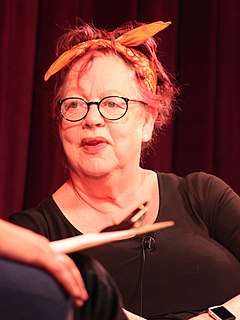A Quote by Anthony Minghella
The imaginative leap for me of writing for women is no more difficult than the one of writing for men. I've always wanted to have women well represented in the work that I've done because I've always been around them and around the way they look at the world.
Related Quotes
If you just look at the number of roles for women versus the number of roles for men in any given film, there are always far more roles for men. That's always been true. When I went to college, I went to Julliard. At that time - and I don't know if this is still true - they always selected fewer women than men for the program, because there were so few roles for women in plays. That was sort of acknowledgment for me of the fact that writers write more roles for men than they do for women.
It is very difficult to understand why in this country [India] so much difference is made between men and women, whereas the Vedanta declares that one and the same conscious Self is present in all beings. You always criticize the women, but say what have you done for their uplift? Writing down Smritis etc., and binding them by hard rules, the men have turned the women into manufacturing machines! If you do not raise the women, who are living embodiment of the Divine Mother, don’t think that you have any other way to rise.
I always have done work on mythic relations since I started writing. I really want to be a novelist, or at least a writer of imaginative work... I do try to make my critical studies imaginative and try to write them in ways that are more like literature than philosophy, but I have disappointed myself because I am still so wedded to criticism.
When we look at women, we have to look at the significance of their work in a different way from the way we look at it with men. Women have more often worked within the home, working equally as hard, I would argue, but not always out there where they're counted, not always up there in the labor unions, certainly not in leadership positions.
So many of my friends have always been women growing up... I always feel slightly more comfortable around women because with guys in general there's always more of a danger zone... it's very aggressive sometimes the way guys act with each other, putting each other down and calling each other names, so I was always too sensitive for that and used to hang out with the girls. And they were always really funny to me.
If you look at most women's writing, women writers will describe women differently from the way male writers describe women. The details that go into a woman writer's description of a female character are, perhaps, a little more judgmental. They're looking for certain things, because they know what women do to look a certain way.
What I find interesting and heartening, though, is that there does seem to be a shift in the subject matter being written about by women that is doing well in the culture. We're seeing more women writing dystopian fiction, more women writing novels set post-apocalyptic settings, subjects and themes that used to be dominated by men.
Women have always been more critical of marriage than men. The great mysterious irony of it is - at least it's the stereotype - that women want to get married and men are trying to avoid it. Marriage doesn't benefit women as much as men, and it never has. And women, once they are married, become very critical of marriages in a way that men don't.
I know there are certain men that hate women or don't like women, and in order to make women feel small, they tend to isolate them when they bully them. And women are often humiliated by it and feel they can't do anything about it. So my advice to women would be: there's always support around for those sorts of things and if you feel you're isolated in any way, or being bullied, you must talk to someone about it.
Men create their own gods and thus have some slight understanding that they are self-fabricated. Women are much more susceptible, because they are completely oppressed by men; they take men at their word and believe in the gods that men have made up. The situation of women, their culture, makes them kneel more often before the gods that have been created by men than men themselves do, who know what they've done. To this extent, women will be more fanatical, whether it is for fascism or for totalitarianism.
I'm always astounded at the way we automatically look at what divides and separates us. We never look at what people have in common. If you see it, black and white people, both sides look to see the differences, they don't look at what they have together. Men and women, and old and young, and so on. And this is a disease of the mind, the way I see it. Because in actual fact, men and women have much more in common than they are separated.





































